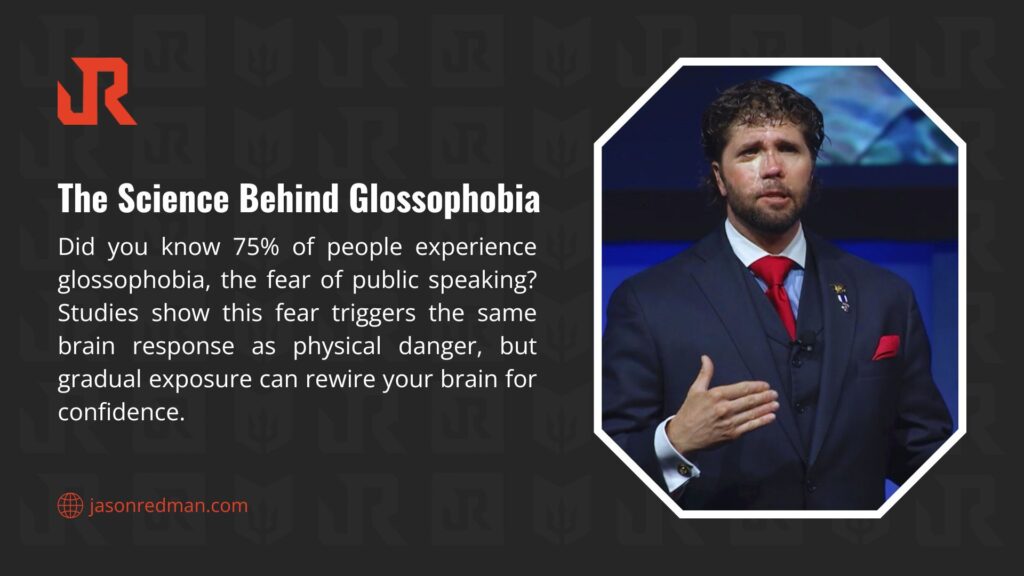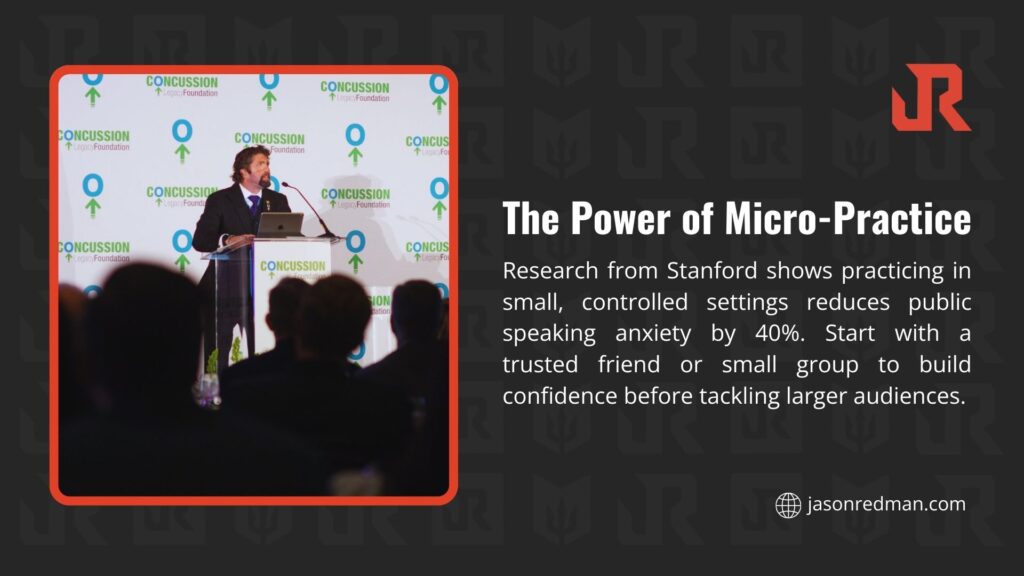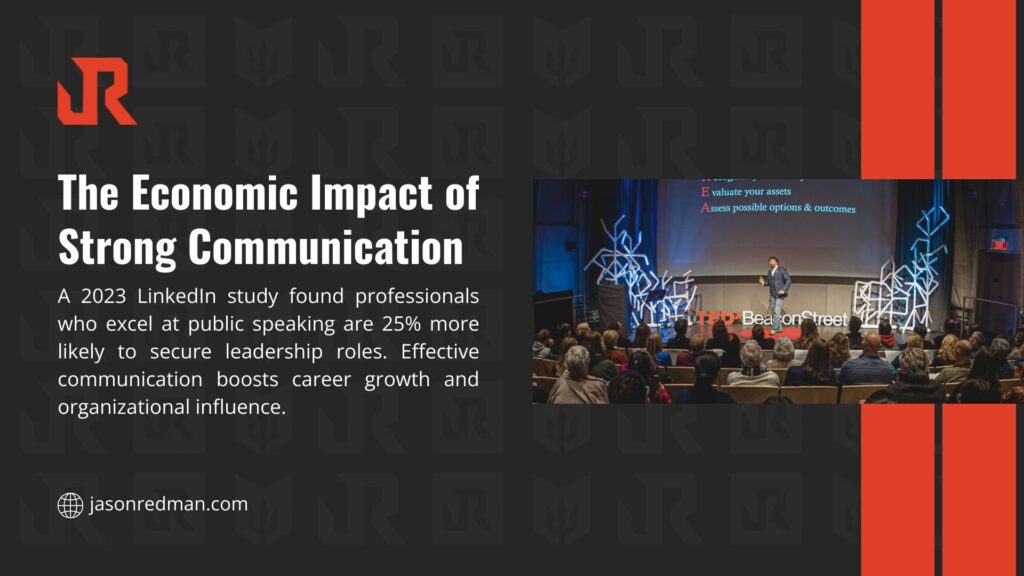Let me tell you about the time I almost chickened out of my first civilian speaking engagement.
There I was, lying in my hospital bed at Bethesda Naval Medical Center, when a Fortune 500 company reached out asking me to speak at their annual leadership conference. Six months earlier, I’d been leading assault teams through hostile territory in Iraq. I’d survived eight gunshot wounds, including one to my face that shattered my jaw. I’d endured 37 surgeries and was still learning to walk again.
But when they asked me to speak to 300 executives about overcoming adversity, my immediate thought was: “Hell no. I can’t do that.”
The fear of public speaking had me more rattled than any enemy ambush ever did. And that’s when I realized something that changed everything about how I approach fear: your brain doesn’t distinguish between a real physical threat and a perceived social one. And until you understand that, you’ll keep fighting the wrong battle.
The Truth About Fear of Public Speaking
Deep in your prehistoric brain, rejection from the group meant death. You needed the tribe to survive, and if they cast you out, you were finished.
That ancient wiring is still running the show. When you step in front of an audience, your amygdala doesn’t see potential networking opportunities or career advancement. It sees a threat to your very existence. Your heart rate spikes, your palms sweat, your throat constricts, and your mind goes blank, the classic fight-or-flight response.
The numbers don’t lie. Approximately 75% of people experience significant fear of public speaking, making it America’s number one phobia. More people fear speaking than fear death, heights, or spiders. This isn’t a character flaw or a sign of weakness. It’s human biology doing exactly what it was designed to do—keep you alive.
But the problem is that the same survival mechanism that kept your ancestors from being eaten by predators is now keeping you from the promotions, opportunities, and leadership roles you deserve.
My Hospital Room Wake-Up Call
Back to that hospital room moment. As I wrestled with declining that speaking opportunity, I had a choice to make. I could let fear win, or I could apply the same tactical mindset that had kept me alive in combat to conquering this new enemy.
I thought about what motivates people to push through their fears. For me, it was the realization that my story—our story—might help someone else get off their own X. That mission became bigger than my fear.
I accepted the speaking engagement. And I bombed. Spectacularly.
My hands shook so badly I couldn’t hold my notes. My voice cracked like a teenager asking someone to prom. I forgot entire sections of my prepared remarks. Afterward, I wanted to crawl into a hole and never speak publicly again.
But something interesting happened during that disaster of a presentation. About halfway through, when I stopped trying to be perfect and started telling my story from the heart, something clicked. The audience leaned in. They connected with the authentic struggle, not the polished performance.
That’s when I understood the real secret to overcoming fear of public speaking, which is that you don’t eliminate the fear, you transform it into fuel for authentic connection.

The SEAL Approach to Speaking Anxiety
In the teams, we have a saying: “You don’t rise to the occasion, you fall to your level of training.” Fear of public speaking isn’t conquered through positive thinking or visualization exercises. It’s defeated through systematic preparation and tactical execution.
Here’s my battle plan for neutralizing speaking anxiety:
- Phase 1: Reconnaissance
Before any mission, you gather intelligence. Who’s your audience? What are their challenges? What do they need to hear? When you focus on serving their needs instead of protecting your ego, fear loses its grip.
- Phase 2: Mission Planning
Your content is your weapon system. Know it inside and out. Practice until you can deliver your core message even if everything goes wrong. Prepare for the 90% you can control, not the 10% you can’t.
- Phase 3: Equipment Check
Master your physical presentation. Practice your posture, your breathing, your vocal projection. Your body language will either reinforce or undermine every word you speak.
- Phase 4: Execution
Show up with the mindset of a professional completing a mission, not a victim facing execution. You have valuable intelligence to deliver. Act like it.
Why Traditional Advice Fails
Most fear-of-public-speaking advice is garbage. “Imagine your audience naked”—ridiculous. “Just be yourself”—meaningless. “Fake it till you make it”—counterproductive.
These superficial public speaking tips fail because they don’t address the root cause: your brain’s threat detection system. You can’t think your way out of a biological response. You have to retrain it through exposure and systematic desensitization.

Here’s what works:
- Start Small and Build: Don’t jump straight to keynote speeches. Practice in low-stakes environments. Speak up in meetings. Volunteer for small presentations. Give yourself wins to build on.
- Record Everything: Video yourself speaking and watch it back. It’s painful but necessary. You’ll see habits you didn’t know you had and can target specific speaker improvements.
- Focus on Service: Shift from “What if I embarrass myself?” to “How can I help these people?” When your mission is bigger than your fear, courage follows.
- Embrace the Nerves: That nervous energy isn’t your enemy—it’s rocket fuel. Channel that adrenaline into passion and intensity. Some of my best speeches happened when I was terrified.
| Fear Response | Tactical Reframe |
| “They’ll judge me” | “They want me to succeed.” |
| “I’ll mess up.” | “Mistakes make me human.” |
| “I’m not qualified.” | “My experience matters” |
| “I can’t handle this.” | “I’ve handled worse.” |
The Cost of Staying Silent
Let me be blunt about what fear of public speaking is really costing you. It’s not just missed opportunities; it’s a systematic undermining of your leadership potential.
Leaders communicate. Period. If you can’t effectively share your ideas, inspire your team, or present your vision, you’re handicapping every aspect of your professional life. Studies show that people with strong communication skills earn 20% more than their peers and are promoted 30% faster.
Every time you decline a speaking opportunity or stay silent in a meeting where you have something valuable to contribute, you’re sending yourself a message: “I’m not worthy of being heard.”
That’s a lie that will poison every area of your life if you let it.
Thriving on Stage
The moment I stopped viewing the audience as a threat and started seeing them as a team waiting for leadership, everything changed. My approach to leadership and change became the foundation of my speaking philosophy.
Fear of public speaking is a fear of judgment, fear of failure, fear of not being enough. But here’s what I learned through 700+ speaking engagements: audiences aren’t looking for perfection. They’re looking for authenticity, value, and genuine connection.
When you show up as yourself—scars, struggles, and all—and deliver content that serves their needs, magic happens. The fear doesn’t disappear, but it transforms into energy that fuels powerful communication.
I’ve watched executives who were terrified of presentations become confident leaders. I’ve seen entrepreneurs who couldn’t pitch their ideas become compelling speakers who attract investors and customers. The transformation is about systematic skill development and mindset shifts.

Your Mission Starts Now
The fear of public speaking has controlled your narrative long enough. Every day you let this fear make decisions for you is another day you’re not fully stepping into your leadership potential.
Your voice matters. Your ideas matter. Your story could be exactly what someone in your audience needs to hear to change their trajectory.
Stop letting biology that served cavemen dictate your modern success. It’s time to get off the X of fear and move toward mastery.
The choice is yours: stay comfortable and limited, or step into the discomfort of growth and unlock the communication skills that will accelerate every aspect of your leadership journey.
Work with me to transform your relationship with public speaking and unlock the confident communication skills that will elevate your influence, expand your impact, and accelerate your success.
Your audience is waiting. Your message matters. Your mission starts now.
For More:


